I've just finished reading quite an interesting article on BBC news about Neanderthal extinction and I must say, I'm quite impressed that such a mainstream media source has given us so many sides (well 2...for and against, but that's much better than most mainstream media) of the climate based extinction argument put forth by Clive Finlayson and his gang. Though the title, "Did Climate Kill off the Neanderthals?" would seem like it would heavily favor the climate driven extinction theory, I assure you, it is a nice summary of the debate. I'm also quite impressed with the fact that a mainstream media outlet is picking up on a relatively recent archaeological debate, I feel like there usually a bit more of a time lag.
I tend to be a little biased on this subject. Being from a biology background I tend to lean a little bit (not too much now, I'm not a living throwback to the Enlightenment's psychic unity) towards an environmental determinist perspective, especially when we are dealing with our more remote hunter-gatherer ancestors whose adaptation to local environments was what survival essentially hinged upon. Thus I tend to side with Finlayson and Carrion in this debate, which is basically that perhaps Neanderthals weren't so cold adapted, and were more adapted to the more moderate environments of the Mediterranean woodlands. Finlayson also stresses however (and it is highlighted in the article), that the picture of Neanderthal extinction is much more complex than simply the environment went sour and the Neanderthals couldn't hack it. It is in my opinion that our cousins were very adaptable, and that climate change was only an overarching theme in their eventual extinction, with much more particularistic contributions to their demise, depending on geographical location. Thus we could have had some direct Modern vs. Neanderthal competition, especially as the Eurasian plains, which favored the early Modern human herd hunting strategy, were expanding further south into the shrinking Mediterranean woodland environments that Neanderthals seemed to be frequenting as their eventual extinction drew nearer. I've recently written a paper on this subject and clearly, Finlayson's work was one of my major sources, as you may be able to tell. Anyway, those are my two cents on the subject.
I have by no means given you the entire story with my biased little perspective there, so after you get the whole story by reading the article let me know what you think!
On a completely unrelated note, it appears that admissions season has begun, as I just heard from one of the schools which I had applied to for graduate studies with their verdict yesterday. You'll be happy to know (well maybe not, you probably don't care all that much, but I'M happy to know!) that I've been accepted into the MA Anthropology (focus on Archaeology) at Washington State University! I see this as a good sign and hope that the other schools I've applied to will be so kind as to admit me into their programs as well! I'll have to wait to hear from all the other schools before I make my final decision, but again, I hope that this is a good sign, and I will keep you updated as what's going on...whether you like it or not! And a big thank you to my reference letter writers (you know who you are)... it appears that your letters are doing the trick!
Subscribe to:
Post Comments (Atom)

4 comments:
That is a great article! The author, Paul Rincon, also wrote basically the only sensible media report about an article I published in Antiquity back in 2003. He called me and interviewed me (in Montreal) for nearly an hour and the article had no significant errors, as a result. Unfortunately when other media outlets started to write about it, they basically just copied from Rincon's article ... poorly.
- Steve
Ok, assuming there is potential for competition between the essentialized Neanderthal and Anatomically Modern Human, just what is competing? The archaeological evidence is basically splitting hairs between more of this cutting tool versus that cutting tool, so is it a behavioural competition? Or is it a competition between the skeletal morphologies? In either sense, a major inhibiting factor for taking this situation beyond mere speculation or story building is just what makes the species distinction between the two groups a reality. So I guess my gripe with a ll this is that nobody really talks about just what went extinct...it is just the general Neanderthal that went extinct.
My competition postulation was purely theoretical, and the competition may not necessarily be all that direct. If we are to take it that neanderthals were better adapted to woodland environments and moderns were preadapted to plains environments than I guess the "distinction" between the two would be behavioural. But not in a one is superior than the other behavioural, in the sense that as the environment increasingly favored the modern human adaptation, neanderthals simply didn't have enough space (woodlands) left to practice their (assumed) close encounter subsistence strategy. Had woodlands expanded instead of the other way around we could theoretically all be neanderthals right now....and maybe we'd be calling moderns neanderthals.....hmmmmmm. Anyway, the competition I feel would be a subsistence strategy competition, seeing as if modern humans were involved they were already successfully exploiting the plains environment, making it difficult for neanderthals to out compete them as the niche would already be filled. Neanderthals may have just been unlucky. And what makes a distinction between species a reality is being able to produce viable offspring. and we simply don't know if moderns and neanderthals could have, and if this is the case, then it's likely that neanderthals didn't really go extinct, maybe just some populations of them did. This is a long comment, and kind of incoherent. oh well.
or as you said, maybe it's just the skeletal morphology itself that went extinct and not neanderthals themselves.
Post a Comment